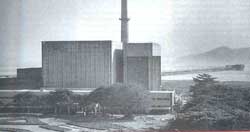
Land ing in trouble
While plans about alternatives to almost all currently used resources abound, no one is talking about managing one crucial resource: terra firma

While plans about alternatives to almost all currently used resources abound, no one is talking about managing one crucial resource: terra firma
As people become more concerned about the environment, a TV channel moves its focus from family dramas and crime thrillers to nature.

Environmental stress has resulted mainly from unsustainable consumption levels in poor nations because of bad land use and degraded village commons and excessive use of non renewable resources in the developed countries. It is imperative that the global

An elated India is elected chairpersons of the International Atomic Energy Agency's board of governors and the organisation's member nations agree to strengthen security around nuclear plants
BLUE IS GREEN: The Ahmedabad-based Arvind Mills is buoyant about a new eco-friendly trademark that has been awarded to it for its blue denim. It is the first Indian manufacturer to get the Eco
TRADITIONAL communities developed ingenious ways of making use of wastewater. And, experts involved in the modern science of ecological engineering can learn a great deal from them. There is a
<p>The severe quake that hit Japan earlier this month and the devastating tsunami that followed it were unfortunate. These two events triggered a series of explosions at Fukushima Daiichi and a few other nuclear power installations. The Dept.

Subsidy amounts and sales figures may not always be indicators of commercial success. After a decade old promotion campaign, only a few Indians own solar cookers and fewer still use them. Is the design, which is incompatible to Indian conditions, t

Nepal's controversial Arun III dam becomes the first World Bank bankrolled project taken up for re scrutiny by the Bank's new Inspection Panel an ombudsman body with teeth

THAT biomass can be an antidote against global warming is an optimistic proposition. It seems unlikely that afforestation can keep pace with the rate of pollution of the atmosphere. Even if it did,

Why do women who attempt changes in local land use patterns meet with so much hostility?

For over 2 months now, the hills of Simlipal in Orissa have been inundated by fierce monsoon showers. Thick foliage dripping water on the undergrowth had turned the soil to slush, to be kneaded by animal hooves. Tracks of animals in search of food mingled

The world over, the pockets where the poor live are used as environmental dumps. PAUL WAPNER debates the environmental ethics of International politics
THIS is the 6th in the World Resources series -- which provides information on environment and development -- and has a special focus on people and the environment. These chapters deal with natural

Given the rich California's zero emission target of 1998, manufacturers have started producing eco friendly cars
Environmental management does not mean changing your light bulbs to use less energy. It means looking at everything you use to see what is beingdestroyed. Have you ever looked at the ingredients in your make up or lotions? Does your moisturizer or lipstick carry the word squalene in the ingredient list? If your answer is yes, then you are partly responsible for destroying the oceans. Squalene is oil derived from the liver of deep-sea sharks. 270,000 sharks are killed every day just for their fins and oil. The oil from their livers goes to the cosmetic industry and the fins go for soup. This enormous and mindless genocide has made 307 species of sharks endangered. In fact, the total number of sharks left in the ocean is ten percent of what they were in 1950. Deep-sea sharks (those living in ocean depths of 300 to 1500 metres) have especially large reserves of squalene since their livers comprise one-third of the weight of the entire animal. So, most deep-sea sharks are caught only for their oil. The excessive catching of these sharks has caused the dramatic population declines of certain species. Some repeatedly targeted shark species are the Aizame shark (dog fish) Leafscale Gulper Shark, and the Gulper, Kitefin and Portuguese dogfish which live between 1300 to 1500 m below sea level. Deep sea sharks grow very slowly, mature late in life and have only a few young in their entire lives. They take long breaks between reproductive cycles, rendering them extremely vulnerable to over-fishing. These sharks are a target species in many industrial fisheries and are frequently caught by fishermen targeting other species. As a result deep sea sharks are at extreme risk and their numbers will take long to recover. The ocean is a very fragile ecosystem. Sharks are apex predators and oceanic food chains are dependent on them. The ocean will implode without predators and our dependence on ocean creatures will impact us tremendously as well. It is immoral to let entire species disappear for the dubious benefits of personal skin specially when there is a renewable alternative in olives. The cosmetic industry has a duty to educate consumers about what they are putting on their faces. Squalene is an oil used in cosmetic products ranging from anti aging creams to lip-gloss to give them a smooth finish and make your skin glisten. It is found in all animals, humans and some plants. It is the sebum oil that your body produces at the root of its hair. In fact it is the same composition as ear wax so it would be cheaper to use that rather than killing such an important species and rubbing its liver oil into your skin. The point is, it is unnecessary. It is not a vitamin or a mineral, it is just oil. Shark-based squalene has a readily available substitute in the market that comes from a purely vegetable origin. Squalene can be obtained from olives and it is of better quality than animal-based squalene and is less expensive as well. Squalene is also found in amaranth seeds, rice bran, wheat germ, fungi and date palm. Vegetable derived squalane is cheaper to produce, more stable against oxidation, of a higher food grade and more compatible with skin than that produced from shark-liver. Oceana is the world's largest international ocean environmental group and is campaigning to end the use of squalene in cosmetic products. As a result some companies have promised to stop using it from this year. Unilever has promised to replace shark derived squalene with plant oil in Ponds and Dove by April 2008 ( However they will still use it in other products). With this decision, Unilever has joined other European-based cosmetic companies that informed Oceana that they do not use this product from threatened animals and prefer sustainable plant-based sources. L'Oreal is also phasing-out products containing shark-based squalene. Other companies are Boots, Clarins, Sisley and La Mer (an Estie Lauder brand. Squalene 'Health Capsules' are another scam. Fly by night companies use the internet to advertise 'pure squalene oil' and 'squalene capsules' making claims about its anti-oxidant properties something consistently debunked by scientists. Among the nonsensical claims made, are those saying that sharks defend themselves therefore their liver oil will make the human body defend itself (I actually read this on an Australian selling site). Other claims are that squalene helps protect against substances that weaken or damage our natural defense systems. There is no clinical evidence to support this. It is is an oil which keeps skin soft - mustard, coconut, olive and all the other oils do. When the cosmetic industry talks about corporate social responsibility, they should start with using ingredients responsibly. Here is no point killing part of the earth and then giving a few dollars to feed children in Ethiopia or creating AIDS awareness. (To join the animal welfare movement contact gandhim@nic.in).
<p>“…………… what was the question?”</p> <p>If you ask someone living in one of our medium or large cities to name the most serious civic problem faced by his city, he will more likely than not say it is the growing problem of traffic.</p>
Skirting commitments on all controversial issues like Special Economic Zones (SEZs) and the Indo-US Civil Nuclear Agreement, the government today made it clear that pro-people, inclusive social and economic policies alone would be pursued in the last year of its five-year term. The President's address to the joint session of Parliament, traditionally a summary of the government's activities during the previous year and its priorities for the coming year, spelt out only those issues on which there was parliamentary consensus. Therefore, while showcase schemes like the expansion of the National Rural Employment Guarantee Programme and the Sarva Shiksha Abhiyan were held up as ways in which the government had embraced the poor, contentious issues like Left extremism, land reforms and labour legislation were not even mentioned in the speech. Much was made of Bharat Nirman, the National Rural Health Mission and the Jawaharlal Nehru Urban Renewal Mission. This was made possible, the government said, because of the performance of the Indian economy that has grown at close to 9 per cent per annum for four years in a row. "The historically high investment rate, of over 35 per cent of GDP, and savings rate, of over 34 per cent of GDP, symbolise a new dynamism in our economy,' the government said in the address, adding that this was all the more creditable against the background of high international oil prices and rising commodity prices. The government said the Indian consumer would continue to be insulated against high international costs of food commodities and oil, putting paid to any tinkering in the duty structure and subsidies in oil and gas. The government said outlays on agriculture, health and rural development had been tripled and together with education, these sectors account for more than half of the Central Gross Budgetary Support as compared to less than one-third in the Tenth Five-Year Plan. "This is a major structural shift in Plan priorities, aimed at reducing disparities and empowering people,' the address said. It added that attention had been focused on areas like agriculture and the target set in the National Common Minimum Programme, of doubling agricultural credit in three years, had been exceeded. However, the government did not commit itself on the implementation of the Radhakrishna report on rural indebtedness. Conscious that it was under fire on the issue of agricultural prices, the address said the government had effected "an unprecedented steep hike of over 50 per cent in the Minimum Support Price (MSP) for wheat and about 33 per cent for paddy in the last four years'. Specific sectoral successes like the legislation for unorganised labour, increase in the level of minimum wage from Rs 66 to Rs 80 per day, increase in the eligibility limit for payment of bonus to workers from Rs 3,500 to Rs 10,000 per month, and the National Rehabilitation and Resettlement Policy for people displaced from their land due to development projects, were also mentioned as landmark schemes. Despite the prime minister's repeated warnings on the performance of the power sector, the President's address only patted itself on the back for allotment of coal blocks with the capacity to support 68,000 Mw of power generation and the identification of nine sites in for setting up coal-based Ultra Mega Power Projects (UMPP) with capacity of 4,000 Mw each. Nor was there any mention of when additional spectrum would be allotted for the telecom industry, even as the government announced that the Indian telecom sector had emerged as the fastest growing in the world with the addition of over 7 million subscribers per month. On SEZs, the address said the government had already provided direct employment to about 100,000 people, with indirect employment estimated at twice as much. "They have attracted investment of over Rs 50,000 crore, and are expected to generate exports of Rs 67,000 crore this year,' the address said. Meanwhile, the third front declared that the President's speech skirted around major problems facing the country, including that of continuing farmer suicides and inflation. The United National Progressive Alliance (UNPA) leaders said they had support of UPA allies CPI(M) and CPI in their attempts to raise these issues in the public realm. According to the Samajwadi Party general secretary Amar Singh, CPI(M) leader Prakash Karat and CPI leader A B Bardhan will be participating in a UNPA-sponsored dharna on farmer suicides to coincide with the presentation of the railway budget on Tuesday.

The future of the Taj Mahal is once again at stake because, the environment versus industry debate notwithstanding, pollution levels in Agra are rising once again.
Get eight economists to discuss an issue and you"ll get nine opinions. Down to Earth did precisely that. Eight noted economists were invited, along with a scientist-activist, an industrialist, a bureaucrat and two educationists, to analyse the impact